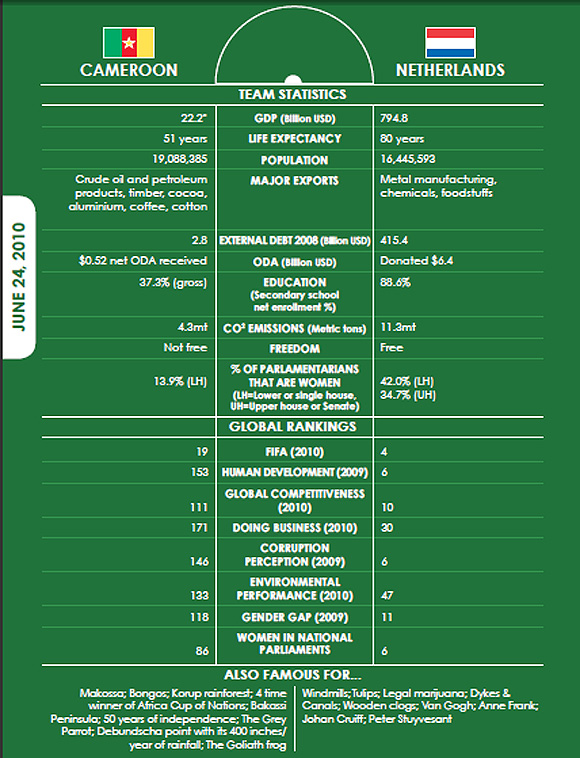From Scandinavian socialist democracies to near-Communist Asian countries –nations of every kind are slagging it out on the field this World Cup.
But is the playing field as level off the pitch as it is on?
The Africa Progress Panel, chaired by former UN Secretary-General Kofi Annan, has prepared a football-inspired guide to illustrate key development issues between countries competing in the World Cup.
Championed by UNDP Goodwill Ambassador, Didier Drogba, the guide provides a brief overview of the relationship or ‘match history” between competitors in selected games.
As Drogba and Anan write in the foreword: “Players and fans, whether from Midrand, Manila, Manchester or Montevideo, all understand the importance of fair play and an impartial referee.
“We passionately believe that this understanding should not be limited to the way countries play, run and score against each other, but also the way they do business and politics with each other; that the spirit of the World Cup should extend into countries’ economic and political relations; that the celebration of our common humanity should not be limited to one month every four years.”
On Thursday night, Group E Cameroon play against The Netherlands in Cape Town. Here is the panel’s breakdown of the real life game between the two countries.
CAMEROON-NETHERLANDS
 Game plan
Game plan
Attempts on target
Development Assistance: The Dutch Development Organization has been operating in Cameroon since 1963. Planned assistance over the next two years is set to focus on improving access to health services and safe drinking water as well as promoting community forestry. (Source: Dutch Development Organization)
Trade: The EU is Cameroon’s largest trade partner, receiving almost 80% of its total exports. The Netherlands are Cameroon’s 5th biggest export partner, after Spain, Italy, the US and France. (Source: EconomyWatch)
Investment: The Netherlands have expressed a strong interest in investing in flower cultivation in Cameroon, an area in which the European country has much experience. (Source: Allafrica.com)
Attempts off target
Trade: While negotiations on an EPA continue, interim agreements have been signed by Cameroon, which has allowed for duty free access to the EU for all cocoa and chocolate products. This has meant an improvement in comparison to the taxes the country was subject to previously. However, under the EPA agreement, some of the cocoa products are not covered by the duty free access and are subject to a higher tariff. (Source: ICCO Annual Survey 2008)
Regulatory Reforms: Despite some recent reforms, Cameroon still ranks as one of the most difficult places in the world to start a business making it hard for companies from developed countries like the Netherlands to enter the market. (Source: World Bank Doing Good Business Report 2010)
Fouls
Agricultural Subsidies: Agricultural productivity is central to Cameroon’s export industry. Owing to the fertile land, almost 70% of Cameroon’s population is engaged in agriculture. The EU’s agricultural subsidies, especially for cotton, which is one of Cameroon’s primary products, are seriously harming Cameroon’s agricultural sector. (Source: EconomyWatch)
Deforestation: Illegal logging is a profitable business in Cameroon and will remain so as long as law enforcement is not strong enough and corruption prevails. While Cameroon has just signed a voluntary partnership agreement on forest governance and trade in forest products with the EU, there remain questions whether this will substantially improve the situation.
 Comparing the teams’ vital stats
Comparing the teams’ vital stats